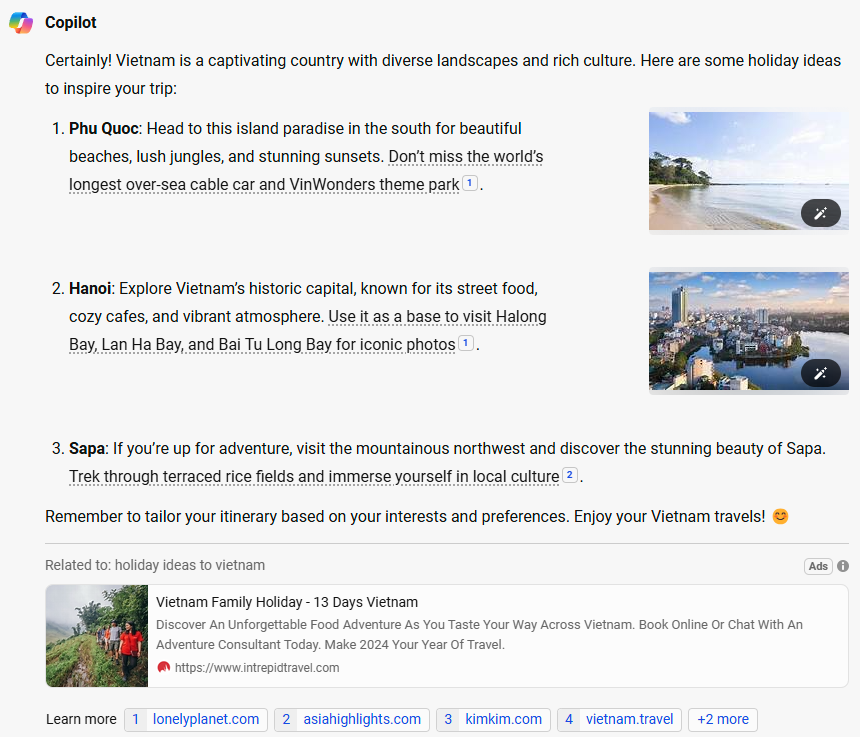The rising potential of sponsored responses in AI-powered search poses risks to information integrity. A balanced approach prioritising transparency, accountability, and user-centric design can mitigate these risks and benefit both consumers and businesses.
Introduction
The effect of GPTs on the digital landscape is evolving at an unprecedented pace, and businesses must adapt to stay ahead of the curve. One significant shift we will see is the rapid emergence of sponsored responses in AI-powered search engines. This new revenue stream has the potential to revolutionise the digital landscape but also raises important questions about the integrity of information and the impact on consumers. In this article, we'll explore the implications of sponsored responses, learn from past experiences, and propose a sustainable approach that benefits all stakeholders.
There is a blurred line between the injection of advertising and sponsored responses, leading to mechanisms of control within the LLM response.
The Rise of Sponsored Responses
Traditional search and access to websites are heading toward a significant crossroads as consumers increasingly access AI-powered search engines to curate the answers they need. This fundamental change in behaviour will force digitally oriented organisations to pivot their strategies, focusing on providing prompt content and curated data ingestion to the GPTs to meet the demands of this new paradigm. Sponsored responses will evolve as a natural progression of this shift, allowing companies to access potential customers or pay for the privilege of having their content, embedded into response results.
Consequences of Sponsored Responses
While sponsored responses offer a new revenue stream, they also pose significant risks:
- Information Bias: Sponsored responses may prioritise corporate interests over accurate and informative content.
- Suppression of Alternative Viewpoints: Sponsored responses may overshadow alternative perspectives, making it harder for users to discover diverse opinions and ideas.
- Commercialisation of Information: The emphasis on sponsored responses could lead to a pay-to-play model, where only those with the means to pay can have their content visible.
- Erosion of Trust: If users feel that search results are being manipulated for financial gain, they may lose trust in the search engines and the information they provide.
The Shift in Consumer Behaviour
As the general usage of GPTs evolves with seamless access to free tools like Gemini, Meta, and Copilot embedded in everyday apps, consumers may become increasingly reliant on these AI-powered tools for answers. This could potentially lead to a decline in general search and website browsing of interests.
The Changing Landscape of Paid Advertising
We understand the current state of paid advertising and sponsored links in search results. However, if that revenue stream is no longer getting the visibility it once had, significant changes will be made to retain that revenue in a different manner. We are already seeing Copilot providing responses with supporting advertising and Gemini curating responses in traditional Google searches.

The Future of Websites and Search Ranking
In the transition period of general consumer adoption of GPT use, AI responses will integrate advertising. As consumers become comfortable with vocal interactions with GPTs and their inherent responses, they may not feel the need to explore beyond the provided answers to the content or websites the insight is derived from. This raises important questions for the future:
- Impact on Website Traffic: What does this mean for websites, ranking in search results, and the ability to get your business's products and services in front of potential consumers?
- SEO Strategies: Businesses may need to rethink their SEO strategies to remain visible in a world where AI-driven responses are prioritised.
Balancing Interests: A Sustainable Approach
A sustainable approach could look like this:
- Sponsored responses are clearly labelled and separated from organic response results.
- GPT engines prioritise transparency and accountability in their algorithms.
- Diverse funding models are encouraged, such as subscription-based services or community-driven platforms.
- Users have control over their response preferences and can opt out of sponsored responses.
- Businesses can still benefit from sponsored responses, but with clear guidelines and regulations to ensure fairness and transparency.
- Search engines prioritise user needs and preferences, ensuring that sponsored responses enhance the search experience without compromising the integrity of information.
Conclusion
The rise of sponsored responses presents both opportunities and challenges for businesses and consumers. By learning from past experiences and prioritising transparency, accountability, and user-centric design, we can create a future where sponsored responses enhance the search/response experience without compromising the integrity of information. As we navigate this new landscape, let's prioritise a sustainable approach that benefits all stakeholders.
Stay across industry updates.
Register to stay across latest updates on Digital, MarTech, AI, Marketing and Data.
By submitting this form, you agree to the terms set out in the privacy policy and terms of website use.
Follow Us